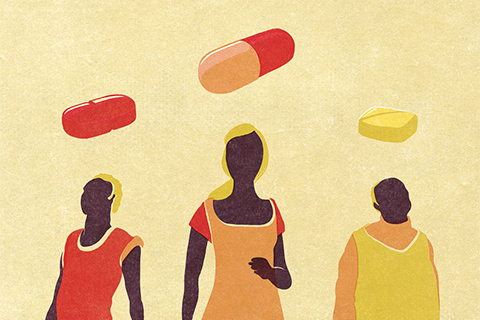More medications than ever before are available for people who have depression. Yet only about a third of patients find an antidepressant that relieves their symptoms. Another third experience little or no improvement. Side-effects also vary: some people get an upset stomach, others can’t sleep or sleep too much and still others experience sexual dysfunction. If we could only make accurate predictions about how people will respond to particular drugs, many more people would be helped in a timely manner.
This is the goal of the Canadian Depression Biomarker Network. Headed by Sidney Kennedy, a U of T professor of psychiatry, the team of researchers will be looking at genes, blood proteins and brain images to see if they can predict how patients will respond to medication.
Finding objective measures – so-called “biomarkers” – that can predict how a treatment will work has been difficult in psychiatry compared with other branches of medicine, such as cardiology. There are many ways for a brain to malfunction, says Kennedy, but to date, few biomarkers for depression are known. Instead, doctors have relied mostly on a patient’s symptoms to prescribe a treatment.
The problem is that different mechanisms in the brain might be working together to produce similar symptoms in patients.
In an effort to tease apart these different mechanisms and to find ways to predict how different types of depression will respond to treatments, the researchers are recruiting 300 patients and 100 healthy subjects at six academic centres across Canada. The study will take three years. The researchers will look to see which gene variants the study participants have and which proteins those genes produce, with a particular focus on those known to play a role in depression or in how the body processes antidepressants. The researchers will also assess the patients for anxiety and how clearly they are able to think, take their family medical history and note any traumatic life events. Finally, they will use EEG to map brainwave activity and functional magnetic resonance imaging to track bloodflow to see what’s going on in the depressed – or recovering – person’s brain.
These data are being collected at three points in the study: before starting on medication, two weeks after starting, and at the eight-week mark. All patients will take the same drug, escitalopram. Kennedy’s aim is to find out what distinguishes the people who do well quickly, the people who do well eventually and the people who never do well on a given antidepressant. It may be that people with a certain combination of genes plus certain brain imaging and blood results can be identified in advance as good responders. “We believe if we combine enough of these markers, we will be able to predict the right treatment for individual patients,” he says.
Kennedy expects that, once it is easier to predict who benefits from what, drug companies will begin to target their medications more specifically. Rather than claiming only 40 per cent of all depressed patients improved, for instance, they might be able to claim 80 or 90 per cent in particular subpopulations – groups that will be objectively identified through biomarkers. In the end, says Kennedy, biomarkers will not only help confirm which people do have depression, what type of depression they have and what medication might work best, they may also point the way to the causes – leading to novel treatments.
Recent Posts
U of T’s 197th Birthday Quiz
Test your knowledge of all things U of T in honour of the university’s 197th anniversary on March 15!
Are Cold Plunges Good for You?
Research suggests they are, in three ways
Work Has Changed. So Have the Qualities of Good Leadership
Rapid shifts in everything from technology to employee expectations are pressuring leaders to constantly adapt






